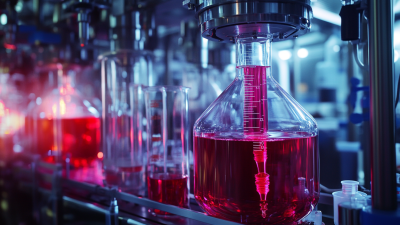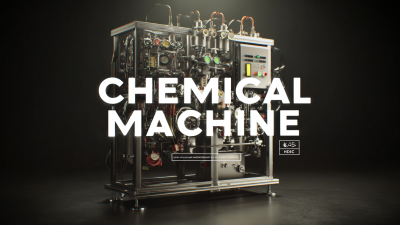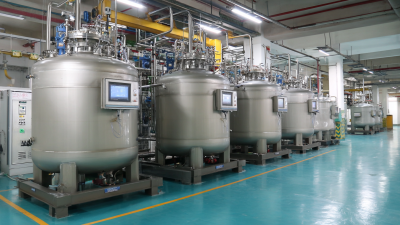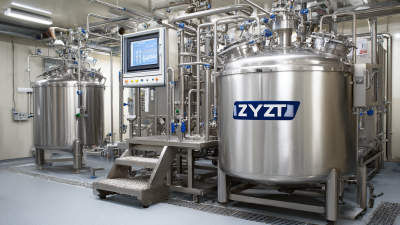
In the realm of modern manufacturing, efficiency and precision are paramount, and one of the critical components driving these qualities is the Chemical Mixture Machine. These advanced devices play a vital role in the production process by seamlessly blending various materials to achieve the desired chemical properties. As industries continue to evolve and demand higher standards, understanding the significance of Chemical Mixture Machines becomes increasingly important.

This article delves into the "Top 5" reasons why Chemical Mixture Machines are indispensable in contemporary manufacturing. From enhancing product quality to optimizing production timelines, these machines have revolutionized how various sectors operate. By examining their functionality, applications, and the benefits they offer, we will provide insights into how they contribute to the overall efficiency and effectiveness of manufacturing processes. As we explore this topic, it will become evident that the integration of Chemical Mixture Machines not only streamlines operations but also fosters innovation in creating new products and formulations.
Chemical mixture machines play a pivotal role in streamlining manufacturing processes across various industries. By enabling precise control over the mixing of chemicals, these machines enhance the efficiency of production lines, particularly in sectors like pharmaceuticals and biopharmaceuticals. With the rise of artificial intelligence in manufacturing, the integration of smart technologies with chemical mixture machines can lead to accelerated innovation, ultimately transforming how new therapies are developed and delivered.
In the pharmaceutical industry, the optimization of formulations, such as improving the solubility of drugs in mixed solvents, exemplifies the essential function of chemical mixture machines. Studies utilizing machine learning to analyze solubility data underscore the need for advanced mixing technology to overcome challenges associated with poorly soluble compounds. This not only contributes to more effective drug development but also fosters competition within the market, pushing manufacturers to refine their processes and enhance product quality. As a result, chemical mixture machines are not just tools but crucial components that facilitate advancements in manufacturing efficiency and innovation.
| Machine Type | Capacity (liters) | Mixing Speed (RPM) | Material Compatibility | Applications |
|---|---|---|---|---|
| Horizontal Mixer | 500 | 300 | Powdered materials, Granules | Food production, Chemicals |
| Batch Mixer | 1000 | 150 | Liquids, Slurries | Cosmetics, Coatings |
| Continuous Mixer | 2000 | 600 | Granules, Liquids | Pharmaceuticals, Plastics |
| Planetary Mixer | 300 | 200 | Viscous pastes, Creams | Baking, Sealants |
| Ribbon Blender | 1500 | 120 | Powdered solids | Chemicals, Fertilizers |
The role of chemical mixture machines in modern manufacturing has become increasingly vital, particularly in the context of current industry trends. With the global chemical production anticipated to grow by 3.5% in 2026, manufacturers are investing strategically in advanced technologies to enhance efficiency and maintain competitiveness. Chemical mixture machines are essential in various applications, enabling precise formulation and blending of materials, which is crucial for meeting evolving industry demands.
Key statistics highlight the significant impact of these machines across multiple sectors. For instance, as industries like aerospace and defense expand, the demand for advanced chemical formulations rises, driving investments in chemical mixture technology. Furthermore, the push for environmental sustainability in sectors such as fashion increases the necessity for these machines to produce eco-friendly materials efficiently, ultimately reducing waste and harmful emissions. As companies navigate these trends, the integration of innovative chemical mixing solutions will play a pivotal role in shaping a sustainable and competitive manufacturing landscape by 2026.
In the rapidly evolving landscape of modern manufacturing, technological advancements in chemical mixing equipment are paramount. Innovations in chemical mixture machines are enhancing efficiency, precision, and sustainability across various industries. With a focus on automation and smart technology, manufacturers are integrating advanced sensors and data analytics into mixing systems, allowing for real-time monitoring and optimization of processes. This shift towards intelligent machinery not only reduces waste but also ensures consistent product quality, addressing the demands of a competitive market.
Moreover, the trends in chemical mixing equipment highlight a growing emphasis on sustainability and the circular economy. As industries strive to minimize their environmental impact, there is an increasing trend towards the development of eco-friendly mixing solutions. This includes the use of recyclable materials in equipment design and the implementation of processes that minimize energy consumption. The rise in sustainability-focused practices positions chemical mixture machines as critical players in maximizing resource efficiency, steering the manufacturing sector towards a more responsible future.
The implementation of chemical mixture machines in production lines offers a strategic advantage in modern manufacturing. A thorough cost-benefit analysis reveals that these machines can significantly streamline processes, reduce labor costs, and enhance product consistency. While the initial investment may seem high, the long-term savings generated through reduced material waste and increased efficiency often outweigh these upfront costs. Manufacturers should consider not only the financial implications but also the potential for increased market competitiveness.
When evaluating the benefits of chemical mixture machines, it is essential to assess the specific needs of your production line. Companies should conduct a comprehensive review of existing processes to identify areas where these machines could improve productivity. Additionally, understanding the technical capabilities of various machines can help in selecting the right equipment that aligns with production goals.
Tips: Regular maintenance of chemical mixture machines can help prolong their lifespan and optimize performance. Training operators on the nuances of these machines is crucial for maximizing their potential, ensuring that staff can quickly identify and rectify any operational issues. Conducting periodic assessments can also aid in adjusting processes based on performance metrics, enhancing overall efficiency.
In modern manufacturing, chemical mixture machines have become indispensable in various industries, showcasing their versatility and efficiency through numerous case studies. For instance, in the pharmaceutical industry, a report from the International Journal of Pharmaceutical Sciences indicates that advanced mixing technology has improved drug formulation consistency, leading to a 25% reduction in production time. Companies like Pfizer have adopted high-shear mixers, enabling them to maintain product quality while increasing output capacity, which is crucial in meeting the market's demand for rapid vaccine production.
Moreover, in the food and beverage sector, the use of chemical mixture machines has transformed production processes. According to a study by the Food Processing Industry Association, manufacturers utilizing automated blending systems have seen a 30% increase in process efficiency and a significant decrease in material waste. Beverage giants, such as Coca-Cola, utilize these machines to ensure uniform flavor distribution across large batches, reflecting the growing trend towards sustainability in manufacturing practices.
These case studies underscore the vital role that chemical mixture machines play in enhancing operational efficiency and product quality across diverse industries.






